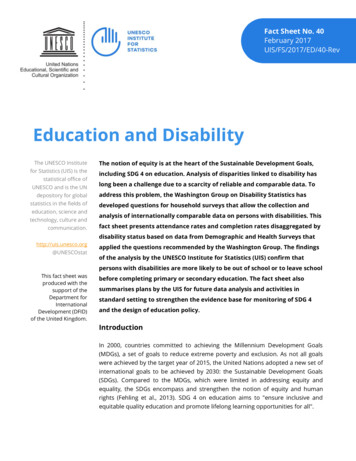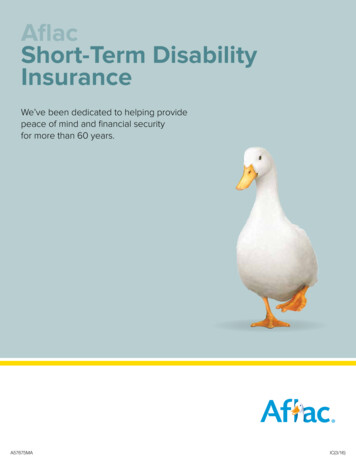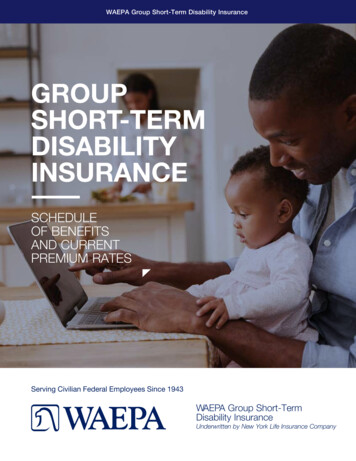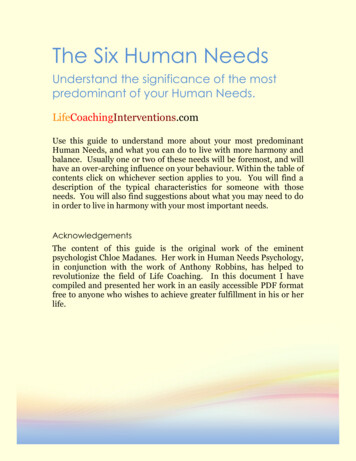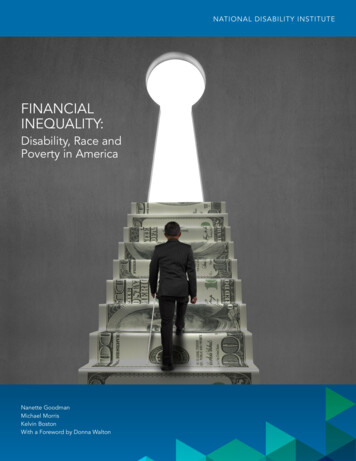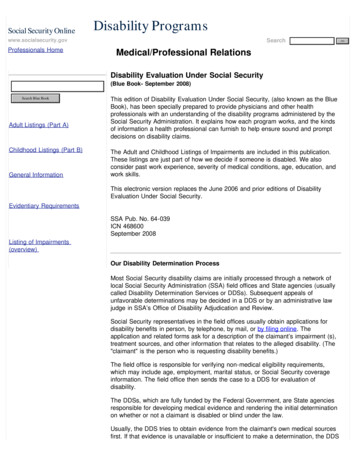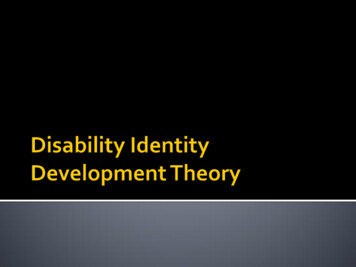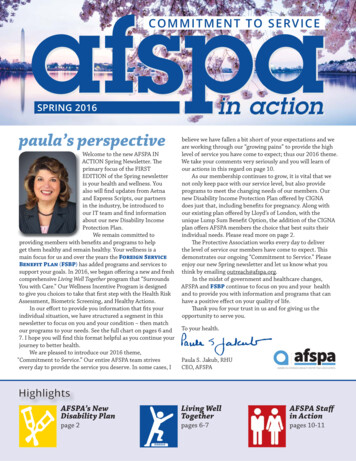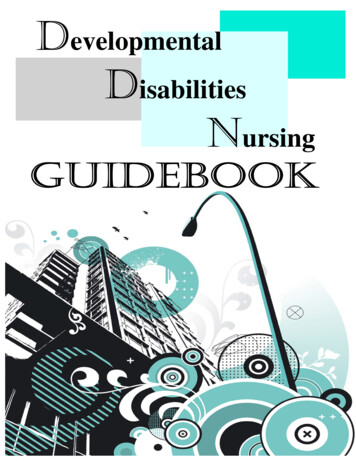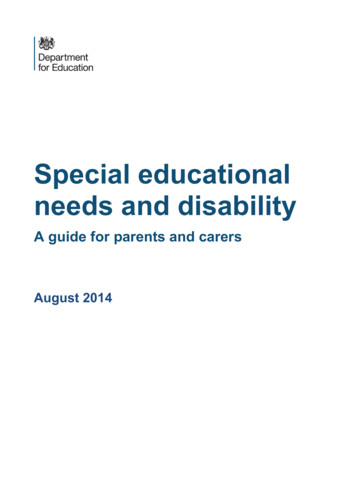
Transcription
Special educationalneeds and disabilityA guide for parents and carersAugust 2014
ContentsForewordIntroductionWho is this guide for?What is it about?When should I use it?How has this guide been produced?Definitions of special educational needs and disabilitySpecial educational Needs (SEN)DisabilitiesWhere to go for help if you think your child has a special educational need or adisabilityThe principles of the systemInformation, advice and supportThe Local OfferSupport for children and young people with special educational needsSEN supportEducation, Health and Care needs assessments and plansRequesting an EHC needs assessmentDeciding whether to conduct an EHC needs assessmentConducting an EHC needs assessmentDeciding whether an EHC plan is neededPreparing an EHC planWhat you can do if you disagree with your local authority’s decisionsPersonal BudgetsSupport for the under 5sChildren under 2Support for children of school ageYoung people aged 16 and over in further educationPreparing for adulthoodChildren and young people in specific circumstancesChallenging or disagreeing with decisionsDisagreement resolutionMediationAppealing to the Special Educational Needs and Disability (SEND) TribunalDisagreeing about other thingsFurther information and useful contactsGlossaryAnnex: Special educational needs and disabilities – moving from the old to the 303437404242434444475556
Transferring children and young people from statements and LDAs to EHC plansWhat if my local authority is part way through assessing on 1 September 2014?What if I disagree with my local authority?3575758
ForewordLike any parent, I want the best for my child. Every parentshould expect people who provide support for theirchildren to make sure that support is the best it canpossibly be. And every child and young person has theright to expect a good education, and the support theyneed to become independent adults and succeed in life.The system for supporting children and young peoplewith special educational needs and disabilities ischanging. For far too long, many families have had tofight for the support they need. That has to stop. I want tosee a system where families are at the heart of things. Asystem where decisions taken by those who provide support for children and youngpeople with special educational needs and disabilities really do put those children andyoung people first.The most important people in any child or young person’s life are their parents. You knowyour children best of all. What you as parents think, feel and say is important. You shouldbe listened to and you need to be fully involved in decisions that affect your children.That’s what the new system is all about.I hope you find this guide useful as an introduction to the new system. It won’t answer allyour questions, but where it can’t, it points you to where you can go for more help.Working together – national government, voluntary organisations, local services, parents,children and young people – we really can make a difference. It’s the least our childrenand young people deserve.EDWARD TIMPSONParliamentary Under-Secretary of Statefor Children and Families4
IntroductionWho is this guide for?This guide is for parents and carers of children and young people aged 0-25 years whohave special educational needs (SEN) or a disability.What is it about?This guide describes how the new system that supports children and young people withSEN or disabilities, and parents, is intended to work.The new system starts from 1 September 2014. But local authorities (see Glossary) willneed some time to move children and young people who were in the old system on to thenew system. At the back of this guide, there is an Annex that explains what the rules arethat local authorities will have to apply when changing to the new system.This guide is written for parents. It covers: What do SEN and disability mean? The principles of the system that supports children and young people with SEN ordisabilities What the law is and what your rights are How the system should work What early years settings, schools, colleges and other educational providers mustdo, or should do, to support you and your child What your local authority and other services (such as health and social services)must do, or should do, to support you and your child What you can do if you disagree with, or want to challenge, decisions that aremade by organisations providing support for your childWhen should I use it?You may find it helpful to use this guide if you think your child has SEN, or you’ve beentold by someone – such as your child’s teacher – that they think he or she has SEN. Ifyou know that your child has SEN and you want to know more about how the systemworks and what to expect, you can use this guide to help you. You might want to use it inmeetings with professionals, or to prepare for them. At the end of each chapter, the guideincludes a page in case you want to write any notes.5
The guide is intended to provide some information covering the whole system. It is alsodivided into different sections so you can easily find the information you need. It aims togive you the key points, but can’t cover everything. At the end of each section there aresignposts to where you can find out more information, and some questions you mightwant to consider asking professionals and others. Towards the back of the guide you canfind a list of organisations and helplines who can offer you more help.How has this guide been produced?Although this is not a legal document, it is based on the Children and Families Act 2014and the Special Educational Needs and Disability Regulations 2014 and the SpecialEducational Needs (Personal Budgets) Regulations 2014. It is also based on the 0-25Special Educational Needs and Disability Code of Practice 2014 (0-25 SEND Code ofPractice) which is statutory guidance (see Glossary). In writing this guide, the Departmentfor Education worked with parents of children and young people with special educationalneeds and disabilities and organisations that represent and advise them. We also lookedat other guidance that had been produced for parents of children and young people withSEN and disabilities.This guide has been published by the Department for Education. The followingorganisations worked with the Department to produce it: Contact a Family The National Network of Parent Carer Forums The National Parent Partnership Network Special Needs Jungle6
Definitions of special educational needs and disabilityThis section is about: Definitions of special educational needs and disability What to do if you think your child has special educational needs or a disability Where to go for helpThe terms ‘special educational needs’ and ‘disability’ have legal definitions. These canbe found in paragraphs xiii – xxiii of the Introduction to the 0-25 SEND Code of Practice.Special educational Needs (SEN)Children and young people with SEN all have learning difficulties or disabilities that makeit harder for them to learn than most children and young people of the same age. Thesechildren and young people may need extra or different help from that given to others.If your child’s first language is not English, does that mean they have a learning difficulty?The law says that children and young people do not have learning difficulties justbecause their first language is not English, although, of course, some of these childrenand young people may have learning difficulties as well.Many children and young people will have SEN of some kind at some time during theireducation. Early years providers (for example, nurseries or childminders), mainstreamschools, colleges and other organisations can help most children and young peoplesucceed with some changes to their practice or additional support. But some children andyoung people will need extra help for some or all of their time in education and training.Children and young people with SEN may need extra help because of a range of needs.Paragraphs 6.27 – 6.35 of the 0-25 SEND Code of Practice set out four areas of SEN:Communicating and interacting – for example, where children and young people havespeech, language and communication difficulties which make it difficult for them to makesense of language or to understand how to communicate effectively and appropriatelywith othersCognition and learning – for example, where children and young people learn at aslower pace than others their age, have difficulty in understanding parts of the curriculum,have difficulties with organisation and memory skills, or have a specific difficulty affectingone particular part of their learning performance such as in literacy or numeracySocial, emotional and mental health difficulties – for example, where children andyoung people have difficulty in managing their relationships with other people, are7
withdrawn, or if they behave in ways that may hinder their and other children’s learning,or that have an impact on their health and wellbeingSensory and/or physical needs – for example, children and young people with visualand/or hearing impairments, or a physical need that means they must have additionalongoing support and equipmentSome children and young people may have SEN that covers more than one of theseareas.DisabilitiesMany children and young people who have SEN may also have a disability. A disability isdescribed in law (the Equality Act 2010) as ‘a physical or mental impairment which has along-term (a year or more) and substantial adverse effect on their ability to carry outnormal day-to-day activities.’ This includes, for example, sensory impairments such asthose that affect sight and hearing, and long-term health conditions such as asthma,diabetes or epilepsy.The Equality Act requires that early years providers, schools, colleges, other educationalsettings and local authorities: must not directly or indirectly discriminate against, harass or victimise disabledchildren and young people must make reasonable adjustments (see Glossary), including the provision ofauxiliary aid services (for example, tactile signage or induction loops), so thatdisabled children and young people are not disadvantaged compared with otherchildren and young people. This duty is what is known as ‘anticipatory’ – peoplealso need to think in advance about what disabled children and young peoplemight needWhere to go for help if you think your child has a specialeducational need or a disabilityChildren and young people with SEN or disabilities will usually be able to get help fromtheir early education setting, school, or college, sometimes with the help of outsidespecialists. This is often where SEN are first identified. If they do identify that your childhas SEN, your school or other setting must contact you (or, if your son or daughter isover 16, they might contact them directly) and should discuss with you what support tooffer your child. The setting must tell you if they are making special educational provisionfor your child.If you think your child has SEN, you should talk to your child’s early education setting,school, college or other provider. They will discuss any concerns you have, tell you what8
they think and explain to you what will happen next. There are other sources ofinformation, advice and support you can access such as: your local authority’s Information, advice and support service your doctor, or other local child health services charities and other organisations that offer information, advice and support. Youshould be able to find information about these from your local authority’s LocalOffer (see section in this guide, The Local Offer)Questions you might want to ask: why do you think my child has SEN or a disability? how do you know that my child doesn’t have SEN or a disability? what happens now?9
Notes10
The principles of the systemThis section covers the principles on which the system is based.The principles of the system are set out in Chapter 1 of the 0-25 SEND Code of Practice.The basic principles you need to keep in mind when thinking about your child’s needsare: All children have a right to an education that enables them to make progress sothat they: achieve their best become confident individuals and live fulfilling lives make a successful transition into becoming an adult – whether that’s intofurther and higher education, training or workAll children with special educational needs (SEN) or disabilities should have their needsmet, whether they are in early years settings (like a nursery or a childminder), in school orin college. When making decisions about SEN or disabilities, your local authority must: have regard to the views, wishes and feelings of children, their parents andyoung people make sure that children, their parents and young people participate as fullyas possible in decisions that affect them provide support to children, their parents and young people so that childrenand young people do well educationally and can prepare properly foradulthoodParents should have a real say in decisions that affect their children, should have accessto impartial information, advice and support and know how to challenge decisions theydisagree withLocal authorities must also involve children, their parents and young people in developinglocal provision and services for children with special educational needs and disabilities.This includes developing their Local Offer (see section in this guide, The Local Offer)Services that provide help for your child (such as your local authority and local healthorganisations) need to work with each other to benefit your child11
Notes12
Information, advice and supportThis section is about what kind of information, advice and support should be available inyour local area.All local authorities, by law, have to provide children and young people with SEN ordisabilities, and their parents, with information and advice. There is an information,advice and support service in every local authority area. This service will be able toprovide information, advice and support for you, and your children, about SEN, disability,health and social care.These services provide factual, impartial and confidential information, advice andsupport. They will be able to offer this face to face, by telephone and online. They will beable to offer support in preparing for and attending meetings, expressing your views andparticipating in decisions made about your child’s education, health and social care.Information, advice and support services will also be able to help you with complaints andappeals. Local authorities sometimes have keyworkers (see Glossary) who can help withthis. You may also be able to get help from an Independent Supporter (see Glossary).Ask your local information, advice and support service for more information aboutkeyworkers and independent supporters. Information on this will also be in your LocalOffer (see section in this guide, The Local Offer).Information, advice and support services will often work with parents and children/youngpeople together but must make sure they also provide a service directly and separately tochildren and to young people.Further informationYou can find out about your local information, advice and support service and how tocontact them from your local authority’s website, by telephoning or writing to your localauthority and in your Local Offer.You can also find the contact details for all information, advice and support services atwww.parentpartnership.org.uk. This website also has information about what standardsyour information, advice and support service should be meeting.You can find out more about Information, advice and support from Chapter 2 of the 0-25SEND Code of Practice. The last section of this guide – Further information and usefulcontacts – includes names and contact details of helplines and organisations thatprovide support to children and young people with SEN and disabilities, and parent13
Questions you might want to ask: what kind of support can I get from my local Service? how can I be sure it’s right and not biased? will they be able to give me support straight away?14
Notes15
The Local OfferThis section explains what the Local Offer is.It explains what your local authority has to do to publish the Local Offer, how children,young people and parents should be involved in producing and reviewing it, and whatparents, children and young people can do if they want to be involved.Every local authority must identify education, health and social care services in their localarea provided for children, young people and families who have SEN or disabilities andinclude them in an information directory called the Local Offer. This will also help localauthorities as they can use it to see where the gaps in provision are. The Local Offer alsoneeds to include information about services provided outside your local area that localpeople are likely to use.Local services should reflect what local people need. Your local authority must askchildren, parents and young people what they think the Local Offer should include, andhow they think people should be able to access it, and most authorities will have workedwith their local Parent Carer Forum to develop this. They must publish what children,young people and parents tell them about their Local Offer and say clearly what they willdo about the comments they receive.Your local authority also needs local schools, colleges, health services and other serviceproviders to contribute to the Local Offer.This Local Offer needs to be kept up to date, and so your local authority will need to seekfeedback from children, young people and parents as part of that process.Further informationIf you want to be involved in developing and reviewing your Local Offer, you shouldcontact your local authority. You could also contact your local Parent Carer Forum (seeGlossary).You can find out more about the Local Offer from Chapter 4 of the 0-25 SEND Code ofPractice.16
Questions you might want to ask: what can I find in the Local Offer? how has it been put together? what can I do if my Local Offer doesn’t include information about services my childneeds? what do I do if I know of a service that isn’t included in the Local Offer?17
Notes18
Support for children and young people with specialeducational needsThis section looks at: SEN support: It aims to describe what it means and what the law requires. It tellsyou what you can expect and where you can go for help. Education, Health and Care (EHC) needs assessment and plans: It aims todescribe who EHC plans are for and the process of an EHC needs assessment. Italso covers how and when children, young people and parents are involved, whatyou can expect, and where you can get help. It also explains what a PersonalBudget is and how you can find out more about them.SEN supportAny support your child gets from their school or other setting should meet their needs.If your child has SEN, they will be able to access help – called SEN support – from theirearly years settings, such as nurseries or childminders (see section in this guide onSupport for the under 5s), schools (see section in this guide on Support for children ofschool age) and further education institutions (see section in this guide on Young peopleaged 16 and over in further education) such as colleges and 16-19 academies.SEN support replaces school action/school action plus (in schools) and early yearsaction/early years action plus (in early years settings).Children and young people with more complex needs might instead need an Education,Health and Care (EHC) plan (see section in this chapter on Education, Health and Careneeds assessments and plans). EHC plans replace statements of SEN and LearningDisability Assessments (LDAs).SEN support is part of what is known as the ‘graduated approach’ and in general shouldwork as follows. (This approach varies in how it works depending on the age of your child– for example, it may work differently in a nursery than it will in a school.)You may be contacted – for example in schools, this will be by your child’s teacher orSENCO – if your early years setting, school or college think your child needs SENsupport. Or you can approach your child’s school or other setting if you think your childmight have SEN. You will be involved and your views will be needed throughout theprocess, and you will be kept up to date with the progress made. Young people aged 16to 25 will be fully involved in designing their own SEN support and provision.19
The four stages of SEN support are Assess Plan Do Review.Assess: Your child’s difficulties must be assessed so that the right support can beprovided. This should include, for example, asking you what you think, talking toprofessionals who work with your child (such as their teacher), and looking at recordsand other information. This needs to be reviewed regularly so that the support providedcontinues to meet your child’s needs. That might mean getting advice and furtherassessment from someone like an educational psychologist, a specialist teacher or ahealth professional.Plan: Your school or other setting needs to agree, with your involvement, the outcomesthat the SEN support is intended to achieve – in other words, how your child will benefitfrom any support they get – and you need to be involved with that. All those involved willneed to have a say in deciding what kind of support will be provided, and decide a dateby which they will review this so that they can check to see how well the support isworking and whether the outcomes have been or are being achieved.Do: The setting will put the planned support into place. The teacher remains responsiblefor working with your child on a daily basis, but the SENCO and any support staff orspecialist teaching staff involved in providing support should work closely to track yourchild’s progress and check that the support is being effective.Review: The support your child receives should be reviewed at the time agreed in theplan. You can then decide together if the support is having a positive impact, whether theoutcomes have been, or are being, achieved and if or how any changes should be made.Your school or other setting can use the Local Offer (see section in this guide, The LocalOffer) to see what help is available that may help achieve your child’s outcomes.Further informationYou can find out more about SEN support by contacting your child’s education provider,or by contacting your local authority’s Information, advice and support service. You canalso find out more from Chapters 5, 6 and 7 of the 0-25 SEND Code of Practice.20
Questions you might want to ask: what kind of support does my child need to enable them to reach the agreedoutcomes? how can I make sure I am being involved and what do I do if I feel I’m not beinglistened to?21
Education, Health and Care needs assessments and plansYour child’s school or other setting will often be able to meet the needs of childrenthrough SEN support. But sometimes a child or young person needs a more intensivelevel of specialist help that cannot be met from the resources available to schools andother settings to provide SEN support. In these circumstances, you or your child’s schoolor other setting could consider asking your local authority for an Education, Health andCare (EHC) needs assessment for your child. This assessment could lead to your childgetting an EHC plan. Some children and young people will have needs that clearlyrequire an EHC needs assessment and plan and once the local authority is aware ofthem it should start this process without delay.An EHC plan brings your child’s education, health and social care needs into a single,legal document. Your child must have special educational needs to be eligible for a plan.There are other ways children who don’t have SEN can get help, and you can ask yourlocal Information, advice and support service for more information about this.Requesting an EHC needs assessmentYou can ask your local authority for an EHC needs assessment if you think your childneeds one. Anyone at your child’s school (such as your child’s teacher) can also ask foran assessment to be carried out. Others who work with your child can also tell the localauthority if they think an assessment is needed (such as your doctor, health visitor ornursery worker).Deciding whether to conduct an EHC needs assessmentOnce your local authority identifies that your child has SEN or receives a request for anassessment, they have up to six weeks to decide whether to carry one out. During thattime, they will ask you and others – such as your child’s school or other setting – forinformation to help them make that decision. You may wish to gather together all thereports and letters from your child’s school or other setting, doctors’ and any otherassessments that have been produced about your child. You may also want to writeabout your child’s needs and how long they have had them.If your local authority decides not to carry out an assessment, they need to let you knowtheir decision within six weeks of receiving a request for an assessment. Your localauthority is expected to help you find other ways that your child can be supported in theirschool or other setting.Conducting an EHC needs assessmentLocal authorities need to make sure that you and your child are fully involved in the EHCneeds assessment. They need to provide you with impartial information, advice andsupport to help you understand the process and make sure you are properly involved in22
decisions that affect your child. This may include help from an Independent Supporter(see Glossary).The assessment includes talking to you and your child and finding out from you whatsupport you think your child needs, and what aspirations you and your child have for hisor her future. The assessment also includes seeking information and views from peoplewho work with your child, such as class teachers, doctors and educational psychologists.Deciding whether an EHC plan is neededAfter your local authority has made its assessment, having involved you and your childfully in the process, it will then decide whether or not an EHC plan is necessary. If theydecide that an EHC plan is not needed, they must tell you within 16 weeks of the datethey received a request for an assessment.Preparing an EHC planIf your local authority decides to proceed with an EHC plan, they should work closely withyou and your child to make sure the plan takes full account of your views, wishes andfeelings. Once the plan has been written, a draft will be sent to you which must notcontain the name of the school or other setting your child will attend. You will be given 15days to comment on the draft and you can ask for a meeting to discuss it if you want one.At that point you will also be able to request a specific school, or other setting, you wantyour child to attend. This could be a mainstream school or special school. Your localauthority has 20 weeks from the request for the EHC needs assessment to issue the finalplan to you.Once an EHC plan has been finalised, your local authority has to ensure that the specialeducational support in section F of the plan is provided, and the health service has toensure the health support in section G is provided. This should help to enable your childto meet the outcomes that you have jointly identified and agreed. Your local authority hasto review your child’s EHC plan at least every 12 months. That review has to includeworking with you and your child and asking you what you think and what you want tohappen, and a meeting which you must be invited to.23
What you can do if you disagree with your local authority’s decisionsIf you disagree with your local authority’s decisions on: not proceeding with an EHC needs assessment not producing an EHC plan, or the special educational support that is included in the EHC planyou have the right to challenge it.Your local authority will tell you when and how you can challenge their decisions. Thereare a number of things you can do which are covered later in this guide in the sectioncalled Challenging or disagreeing with decisions. Your local Information, advice andsupport service will be able to help you.Further InformationYou can find out more about EHC needs assessments and plans by contacting your localauthority’s Information, advice and support service. You can find also find out more fromChapter 9 of the 0-25 SEND Code of Practice.Questions you might want to ask: how will I know if my child needs an EHC needs assessment or plan? exactly how will I be involved in the process? what can I do if I’m not being involved in the process or don’t feel I’m beinglistened to? what do I do if I am told my child doesn’t need an EHC plan? what support is available in my local area?24
Personal BudgetsYou are entitled to request a Personal Budget if your child has an EHC plan or has beenassessed as needing a plan. A Personal Budget is an amount of money your localauthority has identified to meet some of the needs in your child’s EHC plan, if you want tobe involved in choosing and arranging a part of the provision to meet your child’s needs.You (or your representative) will need to agree this with your local authority. A PersonalBudget can only be used for agreed provision in the EHC plan.There are four ways you can use a Personal Budget: Direct payments – where you receive money to buy and manage services yourself An arrangement where your local authority or education provider holds the moneyand commissions the services included in the EHC plan as directed by you (theseare sometimes called notional arrangements) Third-party arrangements – where you can choose someone else to manage themoney on your behalf: A combination of the three ways aboveA local authority must secure a school’s
and the Special Educational Needs and Disability Regulations 2014and the Special Educational Needs (Personal Budgets) Regulations 2014. It is also based on the 0-25 Special Educational Needs and Disability Code of Practice 2014 (0-25 SEND Code of Practice) which is statutory guidance (see Glossary). In writing this guide, the Department

